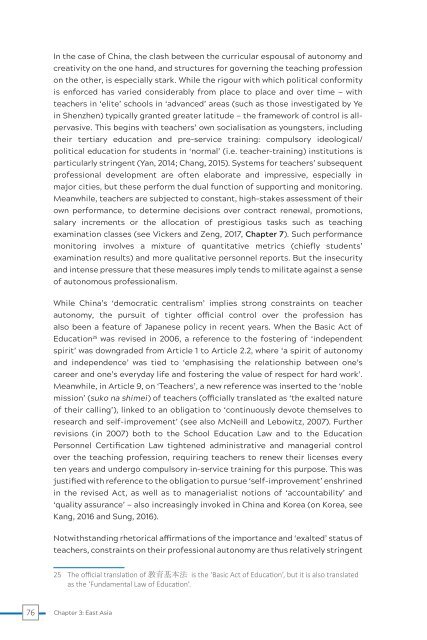Rethinking Schooling for the 21st Century
UNESCO MGIEP officially launched 'Rethinking Schooling for the 21st Century: The State of Education, Peace and Sustainable Development and Global Citizenship' in 2017 at the UNESCO General Conference. This study analyses how far the ideals of SDG 4.7 are embodied in policies and curricula across 22 Asian countries and establishes benchmarks against which future progress can be assessed. It also argues forcefully that we must redefine the purposes of schooling, addressing the fundamental challenges to efforts to promote peace, sustainability and global citizenship through education.
UNESCO MGIEP officially launched 'Rethinking Schooling for the 21st Century: The State of Education, Peace and Sustainable Development and Global Citizenship' in 2017 at the UNESCO General Conference. This study analyses how far the ideals of SDG 4.7 are embodied in policies and curricula across 22 Asian countries and establishes benchmarks against which future progress can be assessed. It also argues forcefully that we must redefine the purposes of schooling, addressing the fundamental challenges to efforts to promote peace, sustainability and global citizenship through education.
You also want an ePaper? Increase the reach of your titles
YUMPU automatically turns print PDFs into web optimized ePapers that Google loves.
In <strong>the</strong> case of China, <strong>the</strong> clash between <strong>the</strong> curricular espousal of autonomy and<br />
creativity on <strong>the</strong> one hand, and structures <strong>for</strong> governing <strong>the</strong> teaching profession<br />
on <strong>the</strong> o<strong>the</strong>r, is especially stark. While <strong>the</strong> rigour with which political con<strong>for</strong>mity<br />
is en<strong>for</strong>ced has varied considerably from place to place and over time — with<br />
teachers in ‘elite’ schools in ‘advanced’ areas (such as those investigated by Ye<br />
in Shenzhen) typically granted greater latitude — <strong>the</strong> framework of control is allpervasive.<br />
This begins with teachers’ own socialisation as youngsters, including<br />
<strong>the</strong>ir tertiary education and pre-service training: compulsory ideological/<br />
political education <strong>for</strong> students in ‘normal’ (i.e. teacher-training) institutions is<br />
particularly stringent (Yan, 2014; Chang, 2015). Systems <strong>for</strong> teachers’ subsequent<br />
professional development are often elaborate and impressive, especially in<br />
major cities, but <strong>the</strong>se per<strong>for</strong>m <strong>the</strong> dual function of supporting and monitoring.<br />
Meanwhile, teachers are subjected to constant, high-stakes assessment of <strong>the</strong>ir<br />
own per<strong>for</strong>mance, to determine decisions over contract renewal, promotions,<br />
salary increments or <strong>the</strong> allocation of prestigious tasks such as teaching<br />
examination classes (see Vickers and Zeng, 2017, Chapter 7). Such per<strong>for</strong>mance<br />
monitoring involves a mixture of quantitative metrics (chiefly students’<br />
examination results) and more qualitative personnel reports. But <strong>the</strong> insecurity<br />
and intense pressure that <strong>the</strong>se measures imply tends to militate against a sense<br />
of autonomous professionalism.<br />
While China’s ‘democratic centralism’ implies strong constraints on teacher<br />
autonomy, <strong>the</strong> pursuit of tighter official control over <strong>the</strong> profession has<br />
also been a feature of Japanese policy in recent years. When <strong>the</strong> Basic Act of<br />
Education 25 was revised in 2006, a reference to <strong>the</strong> fostering of ‘independent<br />
spirit’ was downgraded from Article 1 to Article 2.2, where ‘a spirit of autonomy<br />
and independence’ was tied to ‘emphasising <strong>the</strong> relationship between one’s<br />
career and one’s everyday life and fostering <strong>the</strong> value of respect <strong>for</strong> hard work’.<br />
Meanwhile, in Article 9, on ‘Teachers’, a new reference was inserted to <strong>the</strong> ‘noble<br />
mission’ (suko na shimei) of teachers (officially translated as ‘<strong>the</strong> exalted nature<br />
of <strong>the</strong>ir calling’), linked to an obligation to ‘continuously devote <strong>the</strong>mselves to<br />
research and self-improvement’ (see also McNeill and Lebowitz, 2007). Fur<strong>the</strong>r<br />
revisions (in 2007) both to <strong>the</strong> School Education Law and to <strong>the</strong> Education<br />
Personnel Certification Law tightened administrative and managerial control<br />
over <strong>the</strong> teaching profession, requiring teachers to renew <strong>the</strong>ir licenses every<br />
ten years and undergo compulsory in-service training <strong>for</strong> this purpose. This was<br />
justified with reference to <strong>the</strong> obligation to pursue ‘self-improvement’ enshrined<br />
in <strong>the</strong> revised Act, as well as to managerialist notions of ‘accountability’ and<br />
‘quality assurance’ — also increasingly invoked in China and Korea (on Korea, see<br />
Kang, 2016 and Sung, 2016).<br />
Notwithstanding rhetorical affirmations of <strong>the</strong> importance and ‘exalted’ status of<br />
teachers, constraints on <strong>the</strong>ir professional autonomy are thus relatively stringent<br />
25 The official translation of 教 育 基 本 法 is <strong>the</strong> ‘Basic Act of Education’, but it is also translated<br />
as <strong>the</strong> ‘Fundamental Law of Education’.<br />
76<br />
Chapter 3: East Asia

















